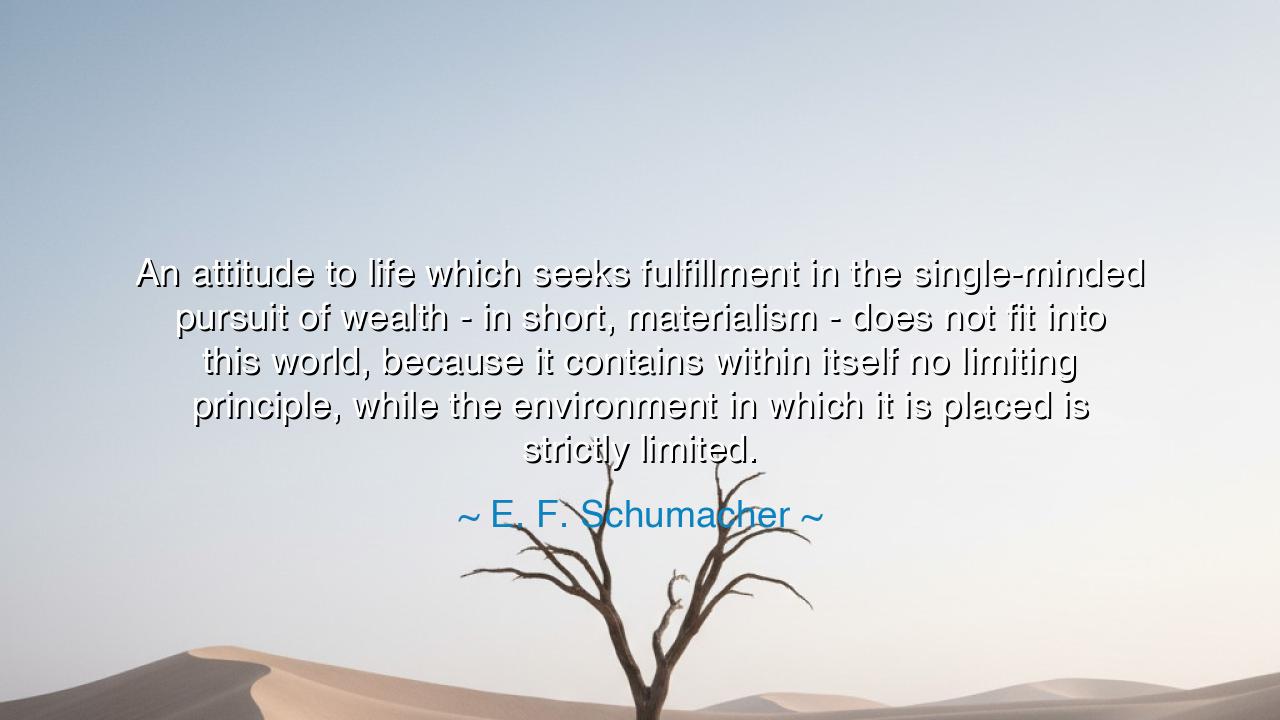
An attitude to life which seeks fulfillment in the single-minded
An attitude to life which seeks fulfillment in the single-minded pursuit of wealth - in short, materialism - does not fit into this world, because it contains within itself no limiting principle, while the environment in which it is placed is strictly limited.






Host: The room felt quiet, the soft glow of the lamp casting long shadows as the world outside slowed into the stillness of night. Jack sat at the table, his fingers lightly resting on a cup of tea, absorbed in thought. Jeeny stood by the window, her arms loosely crossed, gazing out at the street, reflecting on the deeper implications of E. F. Schumacher’s words.
Jeeny: “I’ve been thinking about what E. F. Schumacher said: ‘An attitude to life which seeks fulfillment in the single-minded pursuit of wealth—in short, materialism—does not fit into this world, because it contains within itself no limiting principle, while the environment in which it is placed is strictly limited.’ It’s such a profound statement, isn’t it? The idea that materialism, the pursuit of wealth as an end in itself, doesn’t fit with the reality of the world around us.”
Jack: “Yes, it’s almost like Schumacher is saying that materialism—this single-minded pursuit of wealth—fails to recognize the limits of the world. We live in a world with finite resources, with constraints, and yet materialism has no limits. It keeps growing, wanting more, without regard for the environment or for balance. Eventually, that becomes a problem, because it doesn’t align with the realities of the world we inhabit.”
Jeeny: “Exactly. Materialism is a belief system that demands unlimited growth, that focuses on the idea of more—more wealth, more consumption, more stuff. But the world itself has limits. Our resources are finite, our environment is fragile, and our needs can never truly be endless. In that way, materialism is fundamentally out of sync with the nature of our surroundings.”
Host: The quiet in the room deepened as they both reflected on the tension between an insatiable desire for more and the reality of a world that can’t accommodate limitless consumption. Jack shifted slightly in his chair, his thoughts focused on the core of Schumacher’s argument.
Jack: “It’s like Schumacher is pointing out the unsustainable nature of materialism. It’s not just about the practical limits of resources, but the philosophical limits. If our lives are only about the pursuit of wealth, we’re missing out on everything else—relationships, community, personal fulfillment. The focus on wealth alone doesn’t acknowledge the limits of the environment, or the importance of balance and sustainability in life.”
Jeeny: “Yes, and I think that’s what makes materialism so dangerous. It drives us to consume without considering the consequences. It encourages us to measure success by how much we have, how much we’ve accumulated, rather than by the richness of our lives or our relationships. The world can’t sustain that kind of growth, and we can’t find true happiness in it either. Schumacher is urging us to recognize that fulfillment comes from within—through a balanced life, through relationships, through purpose—not just through the accumulation of things.”
Jack: “So, Schumacher is not necessarily against wealth itself, but against the idea of wealth as the ultimate goal—as something we strive for at the expense of everything else. He’s asking us to reconsider the values that guide us, to rethink what we really need to live a fulfilling life. Materialism blinds us to the more meaningful aspects of life, while also leading us to destroy the very world that sustains us.”
Jeeny: “Exactly. It’s not about rejecting wealth or success, but about redefining them. What if we stopped seeing wealth as the sole measure of success, and instead focused on things like sustainability, community, and balance? Schumacher is reminding us that the world isn’t just an endless reservoir to be tapped for our desires—it’s a system that works in balance, and we need to approach it with respect and consideration for its limits.”
Host: The room had grown quieter, the weight of their conversation settling in. Schumacher’s words had sparked a deeper reflection on the way materialism shapes our lives, on how the pursuit of wealth without regard for limits not only leads to ecological destruction but also to a hollow and unsustainable sense of fulfillment. The world outside had slipped fully into night, but inside, there was a quiet realization that true fulfillment comes not from the pursuit of material wealth, but from balance, sustainability, and a deeper understanding of what truly matters.
Jack: “I think it’s clear now—materialism, as it’s often defined, is a flawed system. It doesn’t recognize the inherent limits of the world, or the fact that happiness and fulfillment aren’t tied to stuff. It’s about recognizing the need for balance, for living in harmony with the world around us.”
Jeeny: “Yes, and that’s where true success lies—when we recognize that the world is limited, that we are part of something bigger than our own desires. When we focus on balance, on sustainability, on the richness of human connection, that’s when we really begin to live in a way that’s both fulfilling and responsible.”
Host: The room had grown even quieter now, the evening’s reflections settling into a deeper truth—that true success and fulfillment come from a life in balance with the world, one that values meaning over materialism, and that recognizes the importance of limits in an increasingly complex and interconnected world.






AAdministratorAdministrator
Welcome, honored guests. Please leave a comment, we will respond soon